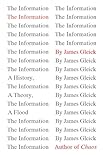 The Information: A History, a Theory, a Flood by James Gleick
The Information: A History, a Theory, a Flood by James GleickMy rating: 4 of 5 stars
I have a soft spot for mathematics. The more complicated and obtuse it gets, the more I like it. It is probably best I didn't figure this out earlier in life, because I might have pursued it and gone crazy. So I enjoy reading about it from time to time.
In The Information, Gleick speaks to the interplay between mathematical progress with science, culture, information theory, and really the development of society. It is an incredible overview of topics ranging from logic to communication to memes. It is DENSE. I spread my reading over a few weeks, a chapter here, a chapter there. When the information started going over my head, I gleefully skimmed it until I could sink back in. The formulas meant very little but then he put musical fragments into it with no explanation, and at least I understood those.
The chapter that first captured me detailed the history of the OED. I loved the logic chapter, talking about Boole and his contributions, someone very important to library theory and I never really knew anything about where all of that came from. It was the last chapter, as well as the epilogue, where Gleick steps beyond his thorough research to offer a few opinions on the direction of information and information overload, that I think the book really shines, or at least, where it was most interesting/useful to me.
I don't know enough to speak to the accuracy of this book, but I feel like I learned a lot, as well as adding a bunch of other books to read to my list that he cites. I will also be ordering it for the academic library where I work, and using it in a presentation I'm giving in February! Win/win/win.
"When information is cheap, attention becomes expensive. For the same reason, mechanisms of search - engines, in cyberspace - find needles in haystacks. By now we've learned that it is not enough for information to exist."
"Too much information, and so much of it lost. An unindexed Internet site is in the same limbo as a misshelved library book. This is why the successful and powerful business enterprises of the information economy are built on filtering and searching."
"Infinite possibility is good, not bad. Meaningless disorder is to be challenged, not feared. Language maps a boundless world of objects and sensations and combinations onto a finite space. The world changes, always mixing the static with the ephemeral.... Everyone's language is different. We can be overwhelmed or we can be emboldened."
"We want the Demon, you see,' wrote Stanislaw Lem, 'to extract from the dance of atoms only information that is genuine, like mathematical theorems, fashion magazines, blueprints, historical chronicles, or a recipe for ion crumpets, or how to clean and iron a suit of asbestos, and poetry too, and scientific advice, and almanacs, and calendars, and secret documents, and everything that ever appeared in any newspaper in the Universe, and telephone books of the future.'"
"As ever, it is the choice that informs us... Selecting the genuine takes work; then forgetting takes even more work."
"The library will endure; it is the universe... We walk the corridors, searching the shelves and rearranging them, looking for lines of meaning amid leagues of cacophony and incoherence, reading the history of the past and of the future, collecting our thoughts and collecting the thoughts of others, and every so often glimpsing mirrors, in which we may recognize creatures of the information."
book sounds interesting. i suck at math and i am very much fascinated by those who love it and are good with it! the take on IT in the book are also cool. agree on the fact that it's not enough for info just to exist to make sense as in the web.
ReplyDeleteI loved maths at school, and a part of me wishes that I had gone on to do my degree in it. I think I might be a bit too rusty for this book at the moment though!
ReplyDelete